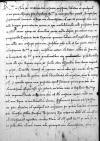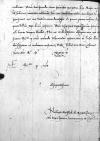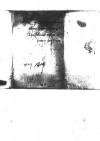Accepto hoc capitaneatu Lucoviensi a ⌊rege⌋ nostro clementissimo id ago, ut principi tum etiam mihi benignum procuratorem geram, in quo constabiliendo mihi praesertim, homini nihil minus quam rei domesticae gnaro, multa desunt, prae ceteris vero in propaganda equirea tanta equarum penuria laboro, ut longo labore quaesitas nullo aere consequi potuerim. Consultum mihi est, ut hac parte uterer munificentia Reverendissimae Paternitatis Vestrae, consultum autem ab amicis multa de singulari benignitate Reverendissimae Paternitatis Vestrae praedicantibus atque praedicantibus perhibentibus tantam illi esse equarum copiam, ut facile citra dispendium bono amico impartiri possit. Proinde tametsi non ignorem me non adeo esse meritum de Reverendissima Paternitate Vestra, qui honeste petere tantum liberalitatem ab ea possim, quia tamen animus est, si quando opera mea, praesertim apud ⌊iuniorem principem⌋, dominum nostrum clementissimum, aliquo usui esse poterit, me totum votis et desiderio Reverendissimae Paternitatis Vestrae exponere tanto audentiore animo ad illam confugio, rogans, velit me vel una equa in rem domesticam iuvare. Si placuerit petitioni meae satisfacere, peto, dignetur id quicquid erit, consignare per praesentium latorem in manus domini ⌊Stanislai Costka⌋ ⌊Prussiae⌋ thesaurarii. Ego autem, ut dictum est, omni officio id munificentiae respondere curabo.
Novi nihil est, quod Reverendissimae Paternitati Vestrae sit a me scribendum. Id unum tacere nolo ⌊principes nostros⌋ clementissimos, optime esse AAWO, AB, D. 4, f. 24v incolumes. Utinam tam secunda aura fruentur perpetuo.
AAWO, AB, D. 4, f. 24v incolumes. Utinam tam secunda aura fruentur perpetuo.
Ex ⌊Moscis⌋ certi nihil habemus. Nuntiatur multorum litteris ⌊eos⌋ vindictam moliri, non desunt tamen, qui hidden by binding⌈[ui]ui hidden by binding⌉ significant eos iam tantum animi demisi written over s⌈sii written over s⌉sse, ut poenis pacem ambire eligant hidden by binding⌈[ant]ant hidden by binding⌉ quam bellum exp demum experiri. Utinam resipiscant. Quid horum futurum est, breve tempus docebit.
His me et deditissima obsequia mea gratiae et favori Reverendissimae Paternitatis Vestrae commendo, vehementer optans, Dominus noster Ihesus illam diu sospitem et incolumem conservet.
 AAWO, AB, D. 4, f. 1 unnumbered after f. 24
AAWO, AB, D. 4, f. 1 unnumbered after f. 24  AAWO, AB, D. 4, f. 24v incolumes. Utinam tam secunda aura fruentur perpetuo.
AAWO, AB, D. 4, f. 24v incolumes. Utinam tam secunda aura fruentur perpetuo.

